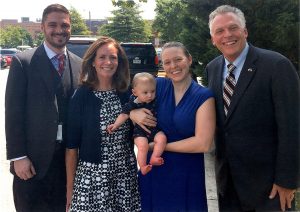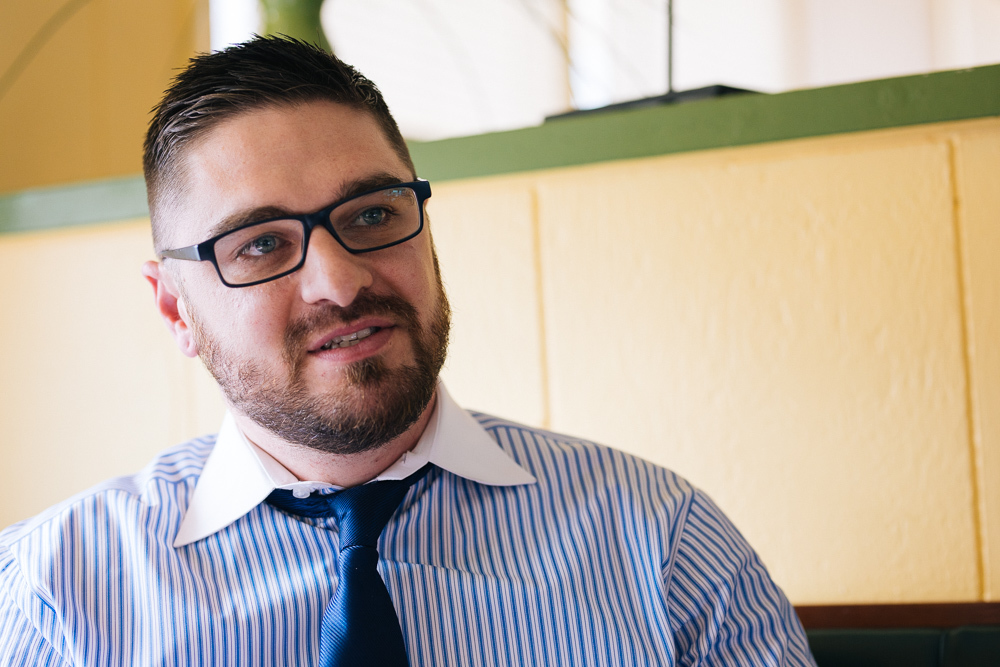Caleb Johnson never was very interested in working with veterans, but a decade after his military tour in Iraq, the 2013 graduate of the Eastern Mennonite University master’s in counseling (MAC) program can see his positive impact in doing just that.
Johnson is one of four regional directors for Virginia Veteran and Family Support (VVFS), operated by the Virginia Department of Veteran Services. Based in Manassas, he provides administrative support and staff oversight to the northern region. The agency connects veterans and their families to behavioral health, peer support and justice services, and provides community outreach and education.
Johnson began working for VVFS soon after graduating from EMU. He assumed his current role in 2016 after serving as a program manager for three years and previously as a peer specialist. He was also a Virginia-certified mediator for general district and juvenile and domestic relations courts.
His VVFS leadership has resulted in the establishment of two peer support groups for veterans – the agency’s only two such groups in the state – and he was a member of the steering committee that planned the state’s first court docket in Fairfax County for veterans involved in the criminal justice system.
His additional responsibilities include administrative and staff oversight, management of the regional fiscal plan, development of behavioral healthcare and resource networks, training community mental health providers, strategic planning, and quality assurance of data performance metrics. One particular role he enjoys is providing crisis intervention training to Northern Virginia law enforcement; this involves de-escalation approaches for interacting with veterans in intensifying circumstances.
Shaped by EMU’s MAC program
It was immediately after earning a bachelor’s degree in human development and family studies that Johnson chose to attend EMU’s MAC program.
“I’m really glad I did,” he said. That was in part because unlike other programs, which focus on select theoretical frameworks, EMU’s counseling program encourages students to choose frameworks with which they most identify. While there is no one correct framework, he said, practitioners must have a lens through which to perceive their clients’ experiences or they’ll “get lost in” the situation rather than provide help.
“How I saw the world influenced how I was able to see the clinical relationship,” he said. “EMU is very good at fostering that growth.”

The EMU program – he continues to contribute to it as a contact for students interested in working with veterans and by participating in Alumni Day – also led Johnson to confront his own issues and experiences, which have further sharpened his practitioner lens.
“Everyone who goes into human services does so because of their own story, something they had happen to them,” he said. “You really need to deal with all that and understand it to be able to be in the same shoes as your clients.”
“Caleb was an insightful and reflective student,” remembers Professor Teresa Haase. “He was recognized for his willingness to engage courageous conversation and for his curiosity and deep insight.”
The self-awareness Johnson gained at in the MAC program and his military and work experiences have shaped his leadership style. He has observed and learned a lot about leadership, both good and bad, from his supervisors, and along the way he has developed a balance of effective guidance and personal concern for the staff he supervises.
“Whatever staff have personally going on in their lives that’s brought up to me,” he said, “it is absolutely my responsibility to help them with as much as I can. In human services, your performance is affected by both stressors on the job as well as stressors outside of it.”
Acknowledging that reality has “huge dividends,” he said, and “creates a different level of respect” in his staff.
Finding purpose
Johnson, who now lives with his wife and children near Front Royal, Virginia, grew up in York, Pennsylvania. His military experience stretched over six formative years, beginning the summer before his senior year of high school when he joined the Reserves at age 17. After finishing high school in 2006, he attended EMU as an undergrad – but for just three unsuccessful semesters.
His deployment to Iraq as a military police officer was “rough,” not because of combat but due to personal struggles. When he returned, he said, “I went through my own funk like every veteran does. It was hard to relate to civilians, no matter how much I wanted to forget everything.”
Seeking a fresh start, Johnson enrolled in Pennsylvania State University to finish his bachelor’s degree and eventually found his way back to EMU for graduate school.
When Johnson was first employed at VVFS it was as a peer specialist, a temporary position filling in for another service member who was being deployed for a year. He didn’t take it seriously, he said – until he found that he really enjoyed the work.
Within months he became a program manager, a position that at times “consumed my life in overwhelming stress that brought down barriers I had built around unresolved experiences,” he recalled. During one particularly difficult period he checked himself into an intensive alternative therapy program that he found “life-changing,” called the Boulder Crest Retreat Warrior PATHH (Progressive and Alternative Training for Healing Heroes).
Now, more than five years later and still at VVFS serving many who have faced similar obstacles, Johnson has found purpose in providing help as a veteran to veterans – and in leading his staff, who aren’t all like him.
“It’s awesome to have connection with someone who thinks completely differently than you do, whether that is religion, politics or philosophies,” he said. “Those ideas are all peripheral when you have a shared or common experience with someone, whether in the military, in life outside the military or in Iraq. I love my work and would retire in this position that I’m at right now.”
